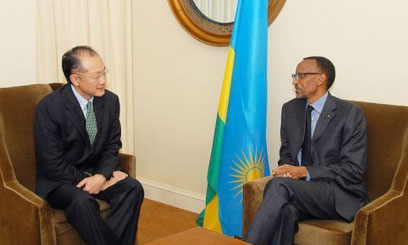While the US nominee faced a challenge for the first time ever, there was little doubt that the Bank’s most powerful shareholders – the United States, Europe and Japan – would support the Korean-American for the powerful job doling out money to developing countries.
But ahead of the meeting of Bank directors, Okonjo-Iweala, herself a veteran of the institution, blasted the way the United States has held a lock on the position since the Bank was launched.
“You know this thing is not really being decided on merit,” she told reporters in Abuja.
“It is voting with political weight and shares and therefore the United States will get it.”
A third candidate, Colombian former finance minister Jose Antonio Ocampo, dropped out Friday also complaining that the selection process was purely political and not merit-based.
There had been some hopes from critics of the Bank that the powerful emerging BRICS economies — Brazil, Russia, India, China and South Africa — might coalesce around Okonjo-Iweala, but those were scotched when Moscow on Friday publicly endorsed Kim.
“The only way around that is if European countries refuse to back the US candidate. In the current context, it doesn’t seem likely,” said Daniel Bradlow, a law professor at American University in Washington.
“Everyone inside the Bank assumes the US guy will win,” a Bank farm-sector specialist told AFP.
By a tacit agreement dating to the sister institutions’ founding, Washington has always chosen the World Bank head while Europe supplies the leader of the International Monetary Fund.
But like the leadership succession last year at the IMF, the race to head the Bank has sparked muscle-flexing by newly empowered emerging economies and poorer countries which have called for a more open process based on merit.
“We have come some way because it’s no longer in the smoke-filled rooms of Europe and the US that the spoils are shared between the IMF and World Bank positions, between those two centres of power. This time the invitation was open to anybody to nominate a candidate,” South African Finance Minister Pravin Gordhan said Monday.
But, he added, “The question is whether the process subsequent to that… has followed through on basic democratic tenets.”
South Africa endorsed Okonjo-Iweala’s quest to succeed president Robert Zoellick, the former US diplomat who will leave at the end of his five-year term in June.
The executive board is meeting Monday to discuss the candidates and a winner, whom the Bank says will be chosen by “consensus”, could be announced by day’s end.
The position is crucial for much of the developing world. The president oversees a staff of 9,000 economists, development experts and other policy specialists, and a loan portfolio that hit $258 billion in 2011, including $43 billion in new loans and grants.
Despite the grumbling from outside the US-Europe axis, the nomination of Kim, a medical doctor with deep experience fighting HIV/AIDS in developing countries and head of prestigious Dartmouth College, marks a significant change from the American bankers and diplomats who have been tapped to lead the Bank in the past.
But critics worry Kim’s experience is not broad enough to handle all of the fields the World Bank deals with, from infrastructure development to environmental protection.
However, Kim has travelled to around a dozen countries to introduce himself, apparently convincingly enough to earn solid respect.









































